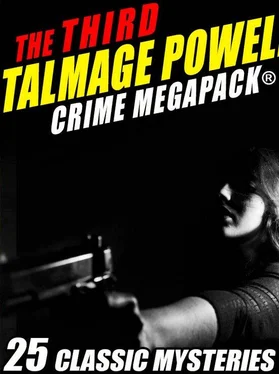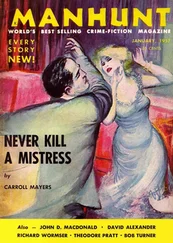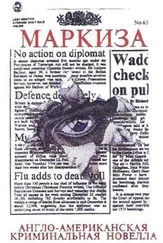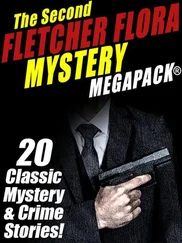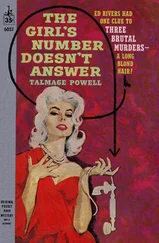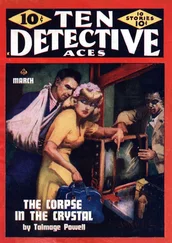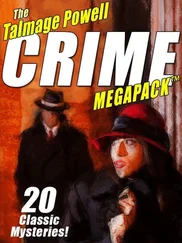Exterior objects began to come in focus. Pain crashed through his head. He was on the hard, bare floor of a room. His eyes picked out cheap, junky furnishings, dirty walls, a wan light bulb glowing in a cheap lamp on a rickety table. A movement beside him caught his eye. He jerked his gaze around. It was a dingy curtain, billowing out from the open window. He heard the faint patter of rain outside. The heat of the night had brought a shower. Droplets of moisture blowing through the open window had awakened him.
He remembered passing out in the alley. Now he was waking in a strange room. It didn’t make sense.
Drawing breath hard, he stumbled to his feet. His toe met an object, sent it clattering. Bob looked down. It took a moment for the fact to sink in that he’d kicked a knife. A long, keen and very bloody knife...
His throat constricted. He picked the knife up, dropped it as he saw his hand. His fingers were encrusted with splotches of dried blood.
His breathing shattered against the dirty walls of the room. He stood without moving an instant, afraid to turn toward the bed, his flesh prickling with horror as he guessed what he would see lying there.
His guess wasn’t wrong. In death, Peewee Darran looked smaller than ever. His thin, stooped body was in a twisted, queer huddle. The grimy sheets were mussed on the swaybacked bed, as if Peewee had struggled. His mouth was open, as if he’d tried to cry out, only to have the sound stopped by the knife that had razored its way across his plucked-chicken neck.
Bob clutched the footboard of the bed and stared at Peewee Darran. He’d hated Darran. Once he’d wanted to kill him. He’d got over that. Three years to think, to come to his senses. But...
Could he have regained partial consciousness there in the alley? Could the kill urge have come upon him, in his befuddled state, and crazed him momentarily? The address that Banklin had given him — had it led him to Darran... a knife... a struggle?
“Hell, no!” Bob choked. “I’m not going to think that. I wouldn’t have done it. I couldn’t have!”
His gaze had come to rest on Darran’s left hand without, at first, noticing anything unusual. Then he realized that Darran’s hand was clenched, pulled up in an awkward position. He moved around the bed, took the chilling hand, pried the fingers open.
At first he thought the hand was empty. Then, almost invisible against the dead flesh, he saw the minute white piece of lint. Part of a feather? It had stuck to Darran’s sweaty flesh, but it could have easily been a piece of down that had worked its way partially from the lumpy pillow. In a last death spasm, Peewee must have clutched at the neatest thing, his pillow — jerking his hand away, still clenched, as death swooped over him.
Bob shook his head. He tried to think. His mind was muddled, the thoughts coming through like car lights stabbing heavy fog.
He looked toward the window. There might be a fire escape, a way that he could get out of here without being seen.
He was halfway to the window when the door behind him slammed open. It brought Bob around in a half crouch. Steve Ivey was standing in the doorway.
A dim light in the deserted hallway silhouetted him. Like a jungle cat, ready to pounce upon its prey, Steve moved forward. The light glinted dully on the gun in his hand.
“I’d stand still if I were you, Bob.” Steve heeled the door closed.
Bob’s mouth set in bitter lines. He looked from Steve to Darran’s body, back to Steve. “I guess you love this, don’t you?”
Steve ignored the question. “Why’d you do it, Bob? Damn you, don’t you know what this will do to her — to Pam? You think it’s worth all that just to get your revenge on Darran?”
“Talk on, copper. You’ll never believe I didn’t do it.”
He watched Steve’s face, the motions of his body. Neat tailored suit; neat, almost handsome face. Neat, inhuman efficiency.
A dumb punk found with a corpse. Caught red-handed. Another conviction for the fair-haired smart boy, the homicide cop. Steve might experience a momentary pang that it was his girl’s brother, but he’d flick it aside. Duty, he’d say. And at headquarters they’d pat him on the back, offer their sympathy, make a legend of him, and Steve would go on until maybe one day he’d become the commissioner.
Bob stood with a great empty space inside of him. He forced calmness into his voice. “How’d you get here, Ivey?”
“A phone call. Another tenant here in the house.”
Bob took a step toward him. “And where’s the tenant? It doesn’t strike you as funny, that kind of call, with the tenant not sticking around to see the excitement when you got here?”
“You’ll have to do better than that, Bob,” Steve said coldly. “Nobody likes to get drawn in murder, even as a material witness. A guy living in a neighborhood like this one wouldn’t stick around after reporting a murder.”
Bob took another step. His brow was hot and damp. A one-time loser already, with plenty of motive. Why look further? Why be silly and complicate a perfectly obvious killing?
He shivered a little, his mouth opening and closing. Steve laughed, smug and sure. “Give me your hands, Bob.”
Bob set his teeth against the cocksureness of the laugh, held out his left hand. Steve Ivey reached toward his back pocket for handcuffs.
Bob moved then, going in fast. His left hand grabbed the gun, swung it up. His right fist smashed Steve in the face. Steve cursed, held to the gun, brought his other hand up in a short, hard jab.
Bob took the blow on his mouth, tasting blood, seeing the swift flash of fire across his brain. He hit Steve again, and again.
He saw Steve’s head snap back, his eyes roll up in his head. Steve began to buckle at the knees, and Bob stepped back. He watched Steve crumple to the floor.
Breathing hard, Bob scooped up Steve’s gun, crossed the room, cracked the door. The hallway was still deserted. With a sob of relief Bob closed the door on Steve’s prone form and Darran’s corpse. He moved quickly toward the stairway that would lead him down to the black, rainy night outside.
The rain had slackened, but the street ahead of the cruising taxicab was still slick with moisture. The neighborhood was one of cheap shops, of old brick buildings with black, vacant-looking windows. Here and there one of the old buildings had been converted into an apartment building.
Before one of these, Bob’s cab pulled to a stop. He paid the driver, tipped sparingly. The driver muttered, pulled the hack away.
Bob stood on the sidewalk a moment. Banklin wasn’t living well, judging from the looks of his apartment. It had taken Bob an hour and a visit to two of Banklin’s old haunts to get this address.
He mounted the steps, entered the building. The vestibule was dimly lighted, thick with old mustiness. Stairs creaked here and there under his feet as he climbed to the second floor.
With the passing of the light shower, the heat had returned to the night. Sweat beaded on Bob’s forehead. Somewhere down the hall a man was snoring loudly.
Bob stopped before the doorway of Banklin’s room. A thread of light showed under the door. He put his ear against the panel, heard nothing at first. Then he heard Banklin’s heavy sigh and the clink of a glass against the neck of a bottle. Bob waited, but there was only that one clink, indicating that Banklin was probably alone.
Bob gripped the doorknob in his sweaty hand, turned it. He jammed the door wide, stepped into the room.
He got a flashing impression of a worn rug, a lumpy couch, a cheap radio almost buried in a mound of racing forms on a table. On the walls were photographs of prizefighters, ball players, night club entertainers: mocking, dusty reminders of Banklin’s better days.
Читать дальше
